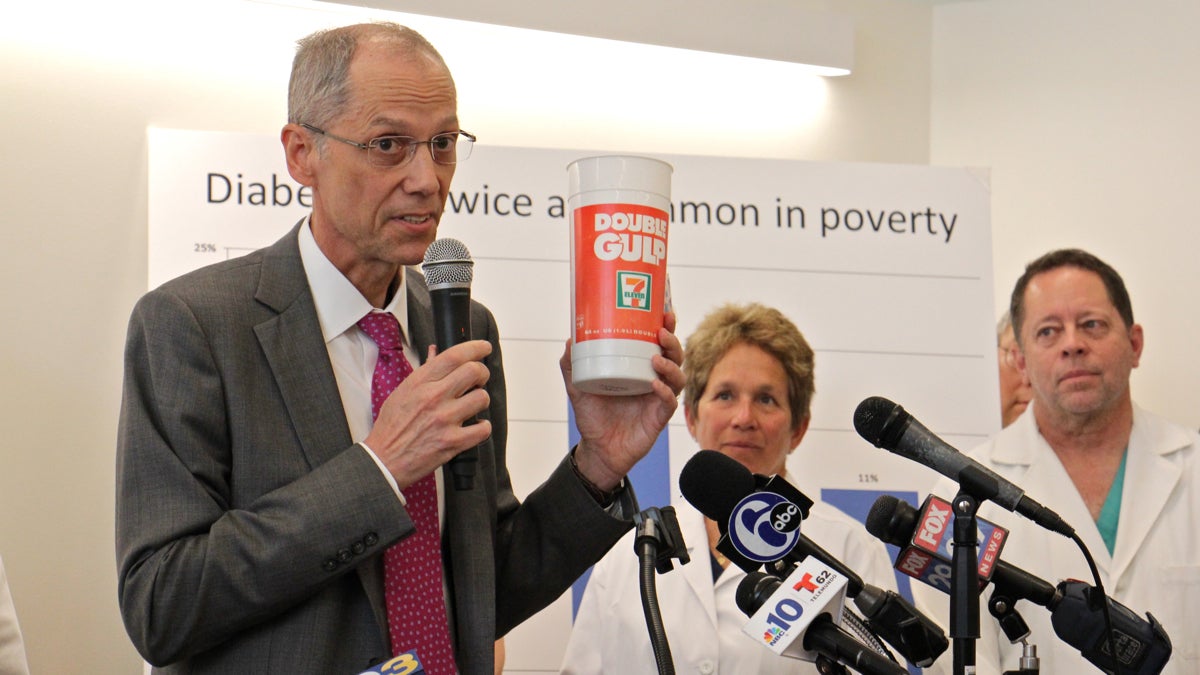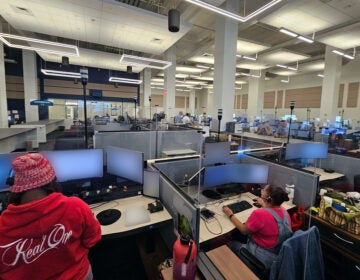Berkeley reports drop in sugar consumption thanks to soda tax
Listen
Philadelphia Health Commissioner Thomas Farley holds up a Double Gulp soda container during a press conference at Puentes de Salud Health Clinic where doctors gathered to tout the health benefits of the sugary drinks tax. (Emma Lee/WHYY)
Philadelphia’s new tax on soda and other sweetened beverages has been praised by public health experts who hope it means people will cut sugar consumption. That’s what researchers have found in Berkeley, California, the first American city to pass a such a tax.
Kristine Madsen and her team of researchers at the University of California, Berkeley surveyed hundreds of people in low-income neighborhoods about their beverage consumption before and after the penny-per-ounce tax took effect last year.
Soda companies tend to target those areas for advertising, Madsen said.
“It’s also true that in low-income neighborhoods, and for Latino and African-American families, we see a much greater proportion of the diseases like obesity and diabetes,” she said.
Her team found consumption of sugary drinks in these neighborhoods dropped by 21 percent, while the number of those who reported drinking bottled and tap water increased by 63 percent.
Berkeley has about 10 percent of Philadelphia’s population, but roughly the same poverty rate (23.8 percent of Berkley residents live below the poverty line, while 26 percent of Philadelphians do).
However, Philadelphia’s tax rate is slightly higher than Berkeley’s at 1.5 cents-per-ounce. It also applies to diet drinks and beverages with artificial sweeteners, which has intrigued public health experts who are unsure how that could affect consumption.
Madsen said she believes Philadelphia will see results smilar to what she found in California.
“My expectation then is that Philly, where people are going to be switching beverages, will probably also shift to more water and that, from a public health perspective, is also the best outcome,” she said.
As one might expect, the soda industry is panning the study as flawed because researchers relied on self-reported data. (Madsen said that is because many bodegas and corner stores in low-income neighborhoods do not keep “scanner data” from their transactions.)
Lauren Kane, a spokeswoman for the American Beverage Association, said the study does not prove Berkeley’s tax “had or will have a measurable impact on public health.”
Despite the threat of a lawsuit from the ABA to stop it, Philadelphia’s sweetened drinks tax is expected to go into effect in January.
WHYY is your source for fact-based, in-depth journalism and information. As a nonprofit organization, we rely on financial support from readers like you. Please give today.




